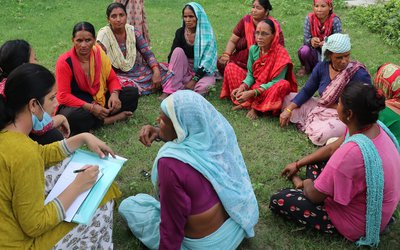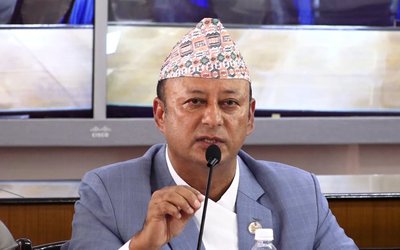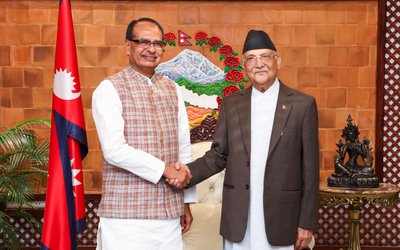
In its capacity as the Chair of the LDC Group to the UN Framework Convention on Climate Change (UNFCCC) and the Kyoto Protocol (KP) for 2013 and 2014, Nepal organised a LDC Strategy Meeting in Kathmandu on 22-23 March 2013 to discuss the outcomes of the Doha Climate Change Conference and develop strategies for the forthcoming climate negotiations. The meeting was attended by selected climate negotiators of Bangladesh, Bhutan, Gambia, Nepal, Senegal, Sudan, Togo and Uganda and representatives of the ecbi, ICCCAD, IIED, and LRI. At present, 49 LDCs are Parties to the UNFCCC.
Opening the meeting, Minister for Science, Technology and Environment Uma Kanta Jha called for a practical strategy that helps to demonstrate the vital role of the LDC Group and guide us in climate negotiations. The meeting was also addressed by Dr. Simon Lucas (DFID, Nepal), Pa Ousman Jarju (former Chair of the LDC Group from Gambia), Dr. Saleemul Huq (Director, ICCCAD and Senior Fellow, IIED) and Prakash Mathema, current Chair of the LDC Group from Nepal. The LDC Strategy Meeting has drafted the Strategy for future negotiations which is expected to be finalised during the Bonn meeting in April before the start of the meeting of the ADP on 29 April 2013.
The years 2013 and 2014 are crucial as Parties to UNFCCC have agreed to adopt a protocol, another legal instrument or an agreed outcome with legal force by COP21 in 2015, and implement it by 2020. The Ad hoc Working Group on Durban Platform for Enhanced Action (ADP) was established by the COP17 in 2011 in Durban, South Africa to develop this instrument. The ADP shall also take into consideration the IPCC fifth Assessment Report (AR5), outcome of 2013-2015 review and works of the Subsidiary Bodies while developing an instrument of legal force.
In Doha (COP18), agreeing the ADP work plan, the COP decided to make available a negotiating text before May 2015. Parties agreed for a more focused discussion and to identify and explore options for a range of actions in 2013 that can close the pre-2020 ambition gap. The UN Secretary-General has planned to organize the meeting of the world leaders in 2014. Poland will host COP19 in Warsaw in November 2013 and COP20 will be held in Latin America, and this instrument is planned to be adopted in Paris in 2015. These COPs will have an important role to streamline the work of the ADP for timely development of the post-2020 legal regime on climate change that are applicable to all Parties to reduce GHGs emission and meet the objectives of the Convention. Furthermore, a number of events will be organized in 2013 and 2014 to crystallize issues for the instrument of legal force.
Nepal as the Chair of the LDC Group has multiple challenges and the opportunities in these two years and could set a tone for 2015 negotiations. The primary challenge is to accommodate the concerns, interests and issues of all 49 LDCs representing mountains, dry-lands, islands and plains of Asia, Africa and the Caribbean island counties. Although there are several commonalities, geographical priorities might differ in the spirit of the Article 4.8 of the Convention. Based on the complicated nature of climate change negotiations, the role and responsibility of the Chair is dramatically increasing and the years 2013 and 2014 are extremely important for developing a solid foundation and consensus for future climate regime.
The Chair of the LDC Group may wish to have a team of experts or knowledgeable persons and logistical team to offer its service in a professional manner. This will be an opportunity for Nepal to enhance negotiation skills as well. For this, timely engagement of Nepal's Core Negotiating Team (CNT) and support team (as decided by the GoN) would help to developing competency and it will be an asset for Nepal on climate negotiations.
Nepal has additional responsibility of generating and mobilizing funds to implement NAPA to address the most urgent and immediate adaptation needs and start the National Adaptation Plan (NAP) formulation process. Hence, Nepal has to provide its services in a professional manner to represent 49 LDCs, and focus in addressing the impacts of climate change at the local level. These twin responsibilities deserve special attention. As Nepal chaired the LDC Group at the global level from 2010 to 2012 in a highly professional manner, it is natural for LDCs and the Nepalese to have increased expectations to capitalise this opportunity.
Nepal should continue to work hard and have a strong commitment to get services from the core teams of negotiators to meet the increased expectations. Working in a balanced manner would provide Nepal opportunities once again to reposition its professional competency for global coordination, this time in climate negotiation. The GoN may wish to better use the services of the CNT members and the support team and/or make a reasonable logistical team to support the Chair to make the coordination effective, efficient and transparent as a matter of high priority, and strengthen the LDC Group as a major negotiating block on UNFCCC process, by developing country capacity as well.

Batu Uprety
Former Joint-Secretary and Chief of Climate Change Management Division, Ministry of Environment (then), and former Team Leader, National Adaptation Plan (NAP) formulation process. E-mail: upretybk@gmail.com
- Sagarmatha Sambad: Likely Bearing the Fruits
- Mar 27, 2025
- Decadal Experience In Preparing The NDC
- Mar 03, 2025
- Over Five Decades Of Concern On Air Pollution
- Jan 16, 2025
- Damaging The Functional EIA Track
- Dec 22, 2024
- Baku CoP29 Outcomes And Nepal's Initiatives
- Nov 26, 2024














